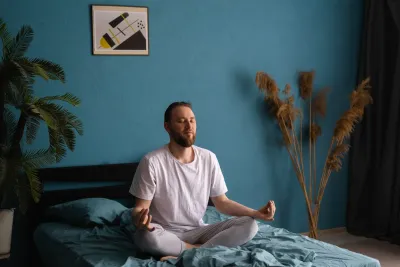
Key Takeaways
Stress and sleep feed into each other, but the right habits, environment, and tools can help calm your system and make rest easier.
- Stress keeps your nervous system on high alert, making sleep harder, while poor sleep increases stress the next day.
- Simple calming practices like slow breathing, cold exposure, or lighthearted moments can help activate your body’s “rest and digest” mode.
- Sleep technology, such as the Chilipad, can support relaxation by creating a cool, consistent sleep surface that cues your body to rest.
- Your sleep environment matters. Cooler temperatures, blackout curtains, and limiting blue light all support better sleep when stress is high.
- Mindset plays a role. Practices like gratitude journaling—or staying calm if sleep doesn’t come right away—can reduce nighttime stress.
We can all agree that sleep doesn't always come naturally, and whatever happens while we're awake often slips into our minds when we finally lie down at night.
You've undoubtedly felt physically exhausted and ready to fall into dreamland, but you suddenly find yourself replaying details from the day, fretting about a conversation you had, or carefully planning what you're going to present in the meeting tomorrow. Or perhaps you manage to sleep initially, only to be snapped awake, bolt upright, your heart pounding as your brain begins to list your anxieties.
If this sounds familiar, you're not alone. A National Sleep Foundation survey found that 43% of individuals aged 13-64 reported experiencing difficulty falling asleep due to stress at least once in the past month. [1]
Elsewhere, reports show that people in the United States feel increasingly stressed in the current climate of inflation and political unrest. [2] The difficulty is the less sleep we get, the less energy we have to deal with worries, and the more stressed we're likely to be – it's a vicious cycle.
Study: How much sleep do we need? An adult's recommended number of hours is typically between 7-8.
How can we break the spiral and ensure we get the rest we need? Here's our short, effective guide on how to get better sleep when stressed.
Don't Let Stress Affect Your Sleep Quality
Our award-winning sleep systems and cooling mattress toppers can help improve the sleep quality that you crave.
Effects of Stress on Sleep
Stress prolongs the time it takes to fall asleep and breaks your sleep once you doze off. Stress stimulates our bodies' stress response system, releasing more of the hormone cortisol, which disrupts sleep.
Cortisol prepares us for “fight or flight” scenarios, so it has a powerful effect on the body and mind. It affects mood, digestion, metabolism, and the immune system. Studies show that sleep deprivation causes your body to secrete more cortisol during the day, which, according to scientists, could compensate for tiredness with greater alertness. [3]
Stress can, therefore, lead to chronic insomnia itself, where people experience problems going to sleep, staying asleep, or getting quality sleep. The majority of people have experienced short-term insomnia at some point in their lives, lasting for a few days or weeks.
Long-term insomnia, on the other hand, continues for months or more and is not as common. Notably, research reveals that stress is one of the main predictors of insomnia. [4]

Ways of Managing Stress
Managing stress effectively can improve sleep quality and is crucial for maintaining both mental and physical health. Below, we will explore various strategies and techniques that can help reduce and control stress in our daily lives, resulting in a good night's sleep.
Exercise Regularly
Physical activity can release feelings of stress, as well as improve mood and lower sleep disturbances. [5] Exercise can reduce stress and also improve depressive symptoms because of anxiety and depression.
Research suggests that regular exercise can improve sleep quality in adults aged over 40 with sleep difficulties. [6]
If you're not physically active, start with a gentle routine. This may include walking, biking, and yoga. Aim to do at least 30 minutes of exercise per day and avoid sitting for long periods of time. When you can, stand while you work and take regular breaks to move.
Eating a Healthy Diet
What you put into your body greatly affects how you feel. People who eat a lot of processed and sugary foods are more likely to experience higher stress levels. [7] Similarly, people with chronic stress may overeat, which can perpetuate these feelings further. Discover the complex relationship between sugar and sleep, as Molly Eastman describes fascinating research on the topic.
Minimizing how much processed and high-sugar food you eat can improve your resilience to stress. Focus on eating a balanced, healthy diet that includes adequate protein, complex carbs, healthy fats and vegetables. Remember to stop eating at least three hours before bed, as your body needs time to digest.
Avoid Long Naps
We understand that sometimes the day can be tiring or a previous night's poor sleep can make it challenging to stay awake. However, naps can negatively affect your next night's sleep and disrupt the sleep schedule you have worked hard to establish.
According to the CDC, the ideal duration of a nap is 15 to 30 minutes. [8] Naps of this length increase alertness, while longer naps can lead to deeper sleep and leave you feeling sluggish and less productive upon waking up.
Limit Use of Technology
In today's world, it's inevitable that you'll spend hours in front of a screen each day. While you probably can't cut your screen time altogether, you must manage it to ensure a healthy, good night's sleep.
Excessive phone use is associated [9] with higher levels of stress, particularly as the blue light from devices suppresses the secretion of melatonin – the hormone that helps us nod off to sleep.
The National Sleep Foundation [10] recommends not using your phone at least 30 minutes before you go to bed. Outside of work, specialists also suggest spending no more than two hours in front of a screen. [11]
Explore Relaxation Techniques
Exploring relaxation techniques can play a significant role in reducing stress. These methods, including mindfulness meditation, progressive muscle relaxation, and deep breathing exercises, work by calming the mind and easing the body's stress responses.
Regularly incorporating these techniques into one's routine can lead to long-term stress management and an overall improvement in well-being.
Did You Know: Studies have indicated that controlled breathing can be effective in managing stress and related conditions. [12]
Be Mindful About Caffeine
While reaching for a coffee, tea, or energy drink throughout the day is tempting, the caffeine in these beverages stimulates your central nervous system, exacerbating stress, harming your sleep. Everyone has different amounts of caffeine they can tolerate, but generally, aim to keep your caffeine intake under 400 mg per day (between four to five cups). [13]
If caffeine makes you anxious or irritable, lower your consumption or cut it completely. Also, remember that caffeine takes a long time to break down and be eliminated from the body so have your last caffeinated drink a minimum of eight hours before bedtime.
Substances to avoid before bedtime include coffee, chocolate, alcohol, and soft drinks.
Read More: How Caffeine Can Affect The Quality of Your Sleep
Practice Self-Care
It can be easy to be hard on yourself when you're stressed and unable to sleep, yet this is actually the prime moment to enact some self-care. In fact, engaging in self-care can [14] lower your stress levels and improve your quality of daily life, too, and it doesn't have to be overly complicated.
Other Lifestyle Changes
- Support from friends and family
- Avoid working late
- Reduce alcohol and caffeine intake
Keep a Regular Schedule
Establishing a routine is crucial if you want to enhance the quality of your sleep. When you go to bed and wake up at the same time every day, your body gets accustomed to it and creates an internal clock that signals you when it's time to sleep and wake up.
Read More: Why Is a Sleep Routine Important
To put this into practice, identify the time of day when you're most productive. If you're a morning person, consider setting a sleep schedule of eight hours from 10 p.m. to 6 a.m. If you're a night owl, you can delay your bedtime, provided your schedule permits, and set your biological clock from midnight to 8 a.m.
Establish an Effective Bedtime Routine
Similar to a regular bed schedule, establishing a bedtime routine is key to managing stress and enhancing your ability to fall asleep. A consistent bedtime routine, such as reading a book, listening to calming music, or practicing relaxation techniques, signals your body that it's time to wind down.
This consistency not only helps in reducing stress but also regulates your internal clock, making it easier to fall asleep.
What Are the Different Types of Stress?
Sometimes used as an umbrella term for any discomfort you feel, stress is divided into three primary types: acute, episodic, and chronic. Knowing which applies to you is key to helping alleviate and manage stress.
Acute Stress
Acute stress is your body's natural response to sudden and threatening stressful situations that require an immediate reaction. This could happen when you encounter a problem that is new, unfamiliar, or potentially dangerous, such as narrowly avoiding a car collision while crossing the street or experiencing an adrenaline surge while riding your favorite rollercoaster.
It's important to recognize that it's a natural and widespread phenomenon that every individual encounters at various moments throughout their lifetime. It is characterized by a short-lived and intense burst of physical and emotional sensations, including heightened heart rate, rapid breathing, sweaty palms, and a surge of energy.
However, your body's response to stress returns to normal relatively quickly after the event is over. Once the perceived threat has passed, your body will naturally begin to relax and return to a state of calmness. This distinguishes acute stress from chronic stress, which is characterized by prolonged and persistent feelings of stress and anxiety that can have a detrimental impact on your mental and physical well-being.
How It Affects Your Sleep
It can significantly impact sleep in several ways. When you experience this type of stress, your body goes into a heightened state of alertness due to the release of stress hormones like adrenaline and cortisol. It can interfere with your ability to fall asleep or maintain restful sleep.
Here's more about this type of stress and sleep:
- Increased Alertness: It can make your mind more alert and hyperaware. This heightened state of awareness can make it very difficult to relax and quiet your thoughts at bedtime, thus delaying the onset of sleep.
- Disruption of Sleep Cycles: The stress response can alter your normal sleep patterns. It can shorten the duration of deep sleep stages, which are crucial for feeling rested. As a result, even if you do sleep, you might wake up feeling unrefreshed.
- Physical Symptoms: The physical symptoms, such as increased heart rate, increased breathing, and muscle tension, can also make it uncomfortable or trouble sleeping. These symptoms can persist even as you try to relax and sleep.
- Nighttime Awakenings: It can lead to more frequent awakenings during the night. You might find yourself waking up abruptly due to stress-related dreams or a general sense of anxiety.
- Overall Sleep Quality: Even if it does not prevent you from falling asleep, it can still reduce the overall quality of your sleep. You might experience insufficient sleep and have less of the restorative sleep that is necessary for good health.
Transform Your Sleep
Struggling to sleep when stressed? Let our sleep systems help you fall asleep and enjoy a more restful night. Find the perfect solution for your sleep needs and transform how you sleep, even on the most stressful days.
Episodic Acute Stress
It's a type of stress that occurs when a person experiences acute stress repeatedly. This can happen when someone is constantly anticipating a distressing event, such as an important presentation or a job interview. People who are prone to anxiety and those who work in high-pressure environments are more likely to experience this form of stress.
It can lead to a range of physical, emotional, and behavioral symptoms, including headaches, insomnia, irritability, and difficulty concentrating. If left unaddressed, it can also increase the risk of developing more serious health problems, such as depression and heart disease.
How It Affects Your Sleep
This type of stress occurs when individuals frequently experience acute stress and can have a more pronounced and disruptive effect on sleep compared to isolated incidents of acute stress. Left untreated can lead to poor sleep and mental and physical well-being.
- Chronic Disruption of Sleep Patterns: Since episodic acute stress involves repeatedly experiencing stress, it can lead to ongoing disruptions in sleep patterns. These same sleep disturbances could manifest as difficulty falling asleep, frequent awakenings during the night, or waking up too early and not being able to fall back asleep.
- Heightened and Prolonged Stress Response: The continuous cycle of stress keeps the body in a heightened state of alertness more often. This prolonged stress response can interfere with the body's ability to relax and wind down, which is critical for activating sleep.
- Impact on Sleep Architecture: Over time, it can alter the architecture of your sleep. What does this mean? The balance between the different stages of sleep (such as REM and non-REM sleep) gets disrupted, which can reduce the overall quality of sleep.
- Increased Risk of Insomnia: People are at a higher risk of developing insomnia. Common sleep disorders, such as insomnia symptoms, include difficulty falling, staying, or getting quality sleep. It can become a chronic issue if stress is not managed properly. Read more about common sleep disorders.
- Mental Health Consequences: The ongoing nature of it can exacerbate mental health issues such as anxiety or depression, which in turn can further disturb your sleep. It creates a cycle where stress leads to sleep problems, which then increases stress levels, making it even harder to sleep.
- Physical Health Effects: Prolonged exposure to stress hormones can also have a physical impact, such as increased heart rate and blood pressure, muscle tension, and digestive issues, all of which can make it harder to fall asleep.
Chronic Stress
Chronic stress, or high-level stress, lasts for an ongoing period of time. It triggers symptoms like headaches, a sore stomach, high blood pressure, and a weak immune system. Chronic stress is also related to depression and cardiovascular disease.
Like any stress, chronic stress can result from living through a traumatic event, having a chronic illness, going through a relationship breakdown, and dealing with many other difficult and stressful life events and changes.
How It Affects Your Sleep
Chronic stress, characterized by a prolonged and constant feeling of stress, can profoundly impact sleep quality and patterns. Here's how it commonly affects sleep:
- Difficulty Falling Asleep: Similar to the above types of stress, it can lead to hyperarousal, where the mind is constantly alert and active. This state can make it hard to relax and quieten the mind, resulting in complications in falling asleep.
- Frequent Nighttime Awakenings: Those experiencing it might wake up frequently during the night. It's a fact that awakenings disrupt the sleep cycle, preventing deep, restorative sleep, which can make it extremely difficult to fall back asleep.
- Altered Sleep Architecture: It can change the structure of your sleep, including how much time you spend in the different sleep stages. For instance, there might be a reduction in REM (Rapid Eye Movement) sleep.
- Increased Risk of Insomnia: Long-term stress is a significant risk factor for the development of insomnia. Common insomnia symptoms include difficulty falling asleep, waking up during the night, waking up too early, not feeling well rested, and more.
- Impact on Sleep Quality: Even when people manage to get enough sleep though, the quality is often poor sleep. They might experience restless sleep and not feel refreshed upon waking.
- Physical Symptoms Affecting Sleep: Chronic stress can lead to various physical symptoms like muscle tension, headaches, gastrointestinal issues, and an increased heart rate, all of which can further disrupt healthy sleep.
- Anxiety and Depression: This can contribute to or exacerbate mental health issues like anxiety and depression, which in turn can lead to more sleep problems, creating a vicious cycle that can be difficult to break.
- Disruption of Circadian Rhythms: It can easily disrupt your body's natural circadian rhythms (your internal body clock), leading to issues like feeling awake at night and sleepy during the day.
Final Thought
Self-care is a critical component in preserving your happiness and overall well-being. Engage in a relaxing activity, such as reading an engaging book, spending special moments with friends and family, engaging yourself in a beloved hobby, or even something as peaceful as a warm bath. They can help reduce sleepless nights.
The beauty of self-care is its inherent flexibility – it doesn't need to be an elaborate or time-consuming affair. What matters most is its regularity and the fact that it's a heartfelt gesture from you to yourself. The objective is to integrate self-care into your daily routine, transforming it into a small yet powerful ritual that revitalizes and energizes you.
In self-care, managing your sleep challenge plays a vital role. Good sleep is fundamental, not just a physical requirement, but a linchpin of mental and emotional stability. During periods of stress, achieving a restful night's sleep might appear daunting, but it remains within your grasp.
Contrary to worse sleep, which can exacerbate stress and diminish well-being, good sleep can enhance your ability to cope with daily challenges and improve your overall quality of life.
To assist in reducing stress, we offer a collection of personalized sleep solutions designed to cater to your unique needs. With these tools and techniques, you can confidently navigate towards better sleep, ensuring that even on the most stressful days, a peaceful night's rest is not just a dream but a reality.
Frequently Asked Questions About Stress and Sleep Quality
How Can Stress Affect My Sleep Quality?
Stress can keep your brain buzzing, delay sleep onset, shorten sleep cycles, and even cause frequent wake-ups—basically hijacking your deep sleep like a bad Wi-Fi connection.
What Are Helpful Strategies To Sleep Better When Feeling Stressed?
Here is a quick checklist to make sleep easier during stressful times:
- Set A Consistent Sleep Schedule
- Create A Cool, Dark, Quiet Sleep Environment
- Use Guided Breathing Or Meditation Apps
- Limit Caffeine And Alcohol Late In The Day
- Write A To-Do List To Offload Mental Clutter
- Try Aromatherapy With Calming Scents Like Lavender
What Are Quick Techniques To Calm Down Before Bed?
You can calm a racing mind with deep breathing exercises, progressive muscle relaxation, journaling, or using meditation apps that act like a digital bedtime buddy.
Peer-Reviewed Research References
-
American Psychological Association.
Stress and Sleep.
APA, 2013.
Study Type: Professional Psychological Association Resource
Key Finding: Chronic stress interferes with sleep onset, sleep continuity, and sleep depth, creating a feedback loop that worsens both stress and sleep quality.
View Resource
Source URL: https://www.apa.org/news/press/releases/stress/2013/sleep
-
American Psychological Association.
More Than a Quarter of U.S. Adults Say They’re So Stressed They Can’t Function.
APA Press Release, 2022.
Study Type: National Survey & Public Health Report
Key Finding: High stress levels are widespread among U.S. adults and are strongly associated with impaired daily functioning, anxiety, and disrupted sleep.
View Resource
Source URL: https://www.apa.org/news/press/releases/2022/10/multiple-stressors-no-function
-
Nicolaides, N. C., Vgontzas, A. N., Kritikou, I., & Chrousos, G.
HPA Axis and Sleep.
Endotext, 2020.
Study Type: Endocrinology & Sleep Physiology Review
Key Finding: Dysregulation of the hypothalamic–pituitary–adrenal (HPA) axis links stress hormones to sleep fragmentation, insomnia, and circadian disruption.
-
Han, K. S., Kim, L., & Shim, I.
Stress and Sleep Disorder.
Experimental Neurobiology, 2012.
Study Type: Neurobiological Review
Key Finding: Stress alters neurotransmitter systems and circadian regulation, contributing to insomnia, reduced slow-wave sleep, and heightened arousal.
View Study
Source URL: https://doi.org/10.5607/en.2012.21.4.141
-
Ellingson, L. D., et al.
Changes in Sedentary Time and Mental Well-Being.
Preventive Medicine Reports, 2018.
Study Type: Longitudinal Observational Study
Key Finding: Reductions in sedentary behavior were associated with improvements in mental well-being, suggesting indirect benefits for stress regulation and sleep health.
-
Yang, P.-Y., et al.
Exercise Training Improves Sleep Quality in Middle-Aged and Older Adults.
Journal of Physiotherapy, 2012.
Study Type: Systematic Review
Key Finding: Regular exercise improved sleep quality, reduced sleep latency, and decreased nighttime awakenings in adults with sleep problems.
View Study
Source URL: https://www.sciencedirect.com/science/article/pii/S1836955312701066
-
Schweren, L., et al.
Diet Quality, Stress, and Mental Health Problems.
Clinical Nutrition, 2021.
Study Type: Large-Scale Cohort Study
Key Finding: Poor diet quality was associated with higher stress levels and increased prevalence of common mental health problems, which may indirectly impair sleep.
-
National Institute for Occupational Safety and Health (NIOSH).
Napping: An Important Fatigue Countermeasure.
CDC, 2020.
Study Type: Occupational Health Guidance
Key Finding: Strategic napping can reduce fatigue, improve alertness, and partially mitigate the effects of sleep loss in high-demand occupations.
View Resource
Source URL: https://www.cdc.gov/niosh/work-hour-training-for-nurses/longhours/mod7/05.html
-
Vahedi, Z., & Saiphoo, A.
Smartphone Use, Stress, and Anxiety.
Stress and Health, 2018.
Study Type: Meta-Analytic Review
Key Finding: Increased smartphone use was associated with higher stress and anxiety levels, which are known contributors to poor sleep quality.
View Study
Source URL: https://doi.org/10.1002/smi.2805
-
Suni, E.
How to Determine Poor Sleep Quality.
Sleep Foundation, 2022.
Study Type: Evidence-Based Sleep Health Resource
Key Finding: Frequent awakenings, daytime fatigue, and difficulty falling or staying asleep are core indicators of poor sleep quality.
View Resource
Source URL: https://www.sleepfoundation.org/sleep-hygiene/how-to-determine-poor-quality-sleep
-
National Heart, Lung, and Blood Institute (NHLBI).
Reduce Screen Time.
NIH, 2013.
Study Type: Government Health Education Resource
Key Finding: Reducing screen exposure, especially before bedtime, supports healthier sleep patterns and stress reduction.
View Resource
Source URL: https://www.nhlbi.nih.gov/health/educational/wecan/reduce-screen-time/index.htm
-
Zaccaro, A., et al.
How Breath-Control Can Change Your Life.
Frontiers in Human Neuroscience, 2018.
Study Type: Systematic Review
Key Finding: Slow, controlled breathing activates parasympathetic nervous system responses, reducing stress and improving physiological markers linked to sleep quality.
View Study
Source URL: https://www.ncbi.nlm.nih.gov/pmc/articles/PMC6137615/
-
Evans, J., Richards, J. R., & Battisti, A. S.
Caffeine.
StatPearls, 2022.
Study Type: Clinical Pharmacology Reference
Key Finding: Caffeine stimulates the central nervous system, increases alertness, and can significantly impair sleep onset and sleep quality when consumed later in the day.
View Resource
Source URL: https://www.ncbi.nlm.nih.gov/books/NBK519490/
-
Ayala, E. E., et al.
Self-Care, Stress, and Quality of Life in Medical Students.
BMC Medical Education, 2018.
Study Type: Cross-Sectional Survey Study
Key Finding: Engagement in self-care behaviors was associated with lower stress levels and higher quality of life, both of which support healthier sleep patterns.
View Study
Source URL: https://doi.org/10.1186/s12909-018-1296-x









